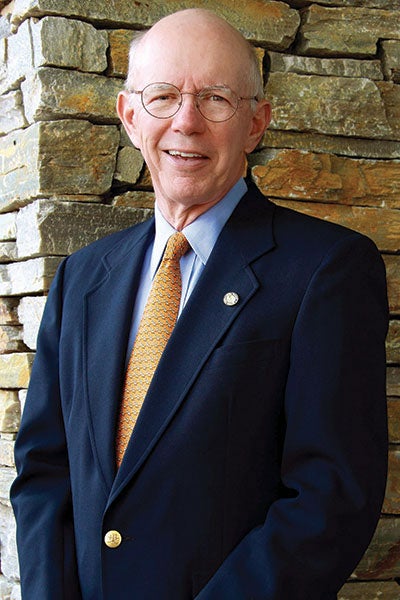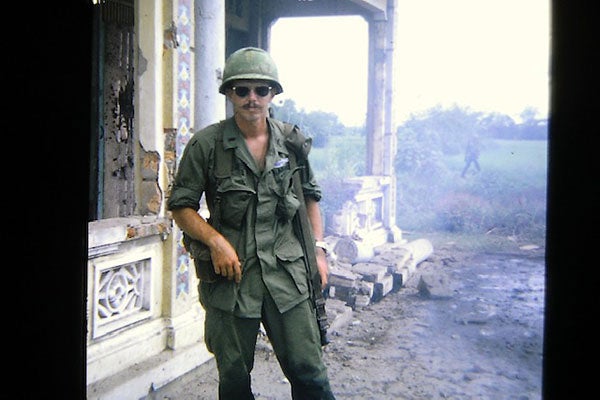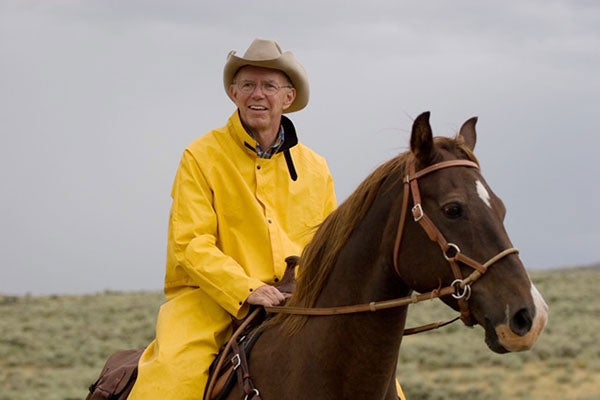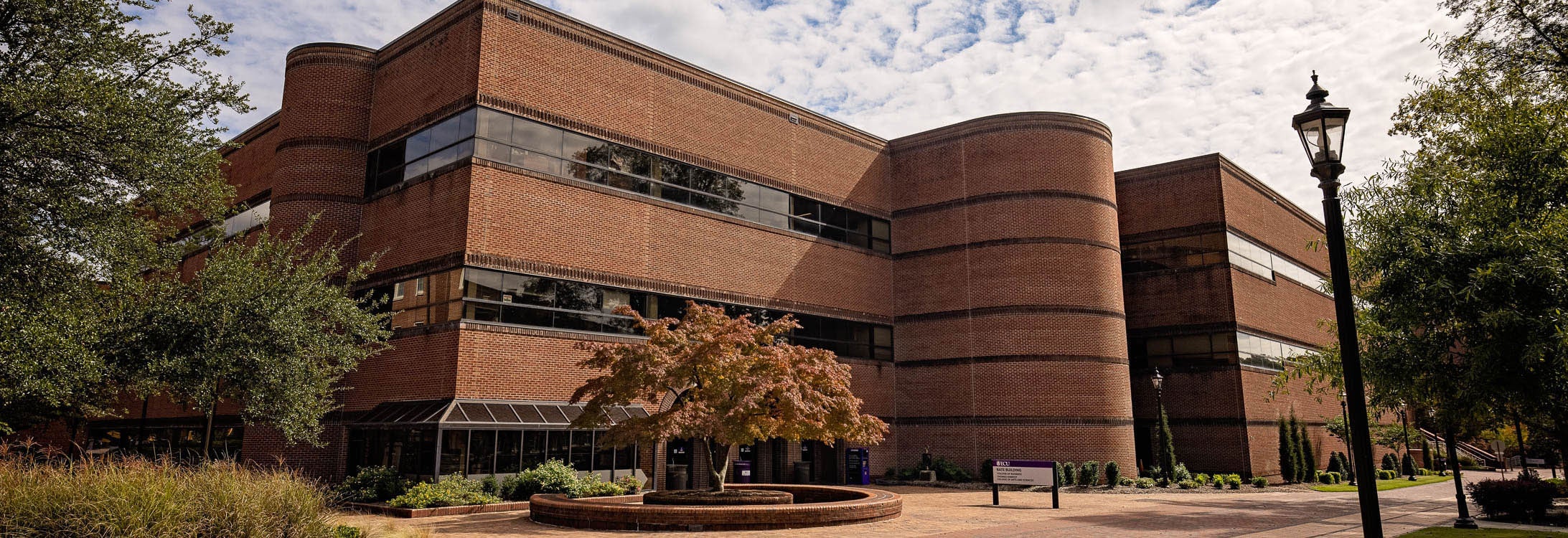INVESTMENT IN ECU
Tom Arthur gives $5 million to College of Business
An exceptional $5 million gift to the East Carolina University College of Business will transform the school’s graduate program and attract more students. The donation from alumnus Tom Arthur ’71 is among the largest in the college’s history, akin to the Miller School of Entrepreneurship.

Tom Arthur received his Master of Business Administration from ECU in 1971. His $5 million donation will support future business graduate students. (Contributed photos)
“The remarkable generosity from Tom Arthur will allow the College of Business to expand and enhance its education of students and bolster its reputation for producing successful business leaders. It’s wonderful to have donors who believe and invest in ECU’s future in such a considerable way,” Chancellor Philip Rogers said.
In addition to strengthening graduate-level education in the College of Business, a portion of Arthur’s gift will be used to support student veterans and military personnel in the program. This could include leadership, travel or internship experiences as well as financial incentives to make enrollment affordable and appealing to military-affiliated students.
“ECU has been very friendly to veterans. I wanted to make sure the College of Business would be military friendly,” said Arthur, an Army veteran with three combat valor awards, a Silver Star, Bronze Star “V” and Gallantry Cross.
The donation is a $2.5 million cash commitment paired with an additional $2.5 million planned gift. Arthur also made a previous $1 million gift to establish the Thomas D. Arthur Distinguished Professorship in Leadership in 2010. His cumulative giving is the largest of any donor to the college.
“Over the years, Tom Arthur’s financial gifts have elevated our faculty, and his appearances at our annual Business Leadership Conference have inspired many students,” said Paul Schwager, dean of the College of Business. “With this new gift, his legacy will be imprinted on the many lives that turn to the College of Business to grow their personal career path.”
Arthur’s latest gift was decades in the making. It began in 1969 when Arthur returned home to Greenville after serving in Vietnam. Thinking he wanted to pursue a graduate degree, he met with then-dean of the College of Business, James Bearden, who convinced Arthur to join the newly formed Master of Business Administration program, “because if you can serve in the military, you’re a leader,” Arthur recalled. “He said, ‘I’m the dean and you’re in.’”
Bearden became Arthur’s mentor and friend — and later — part of the motivation to generously give back to the program.
“He was so impressive,” Arthur said. “Bearden sold all who knew him on ECU, me included, and I am very fortunate to have been associated with him.”
Arthur’s two years at ECU were “wonderful — I felt I was exactly where I should be,” he said. Several years after graduating, Bearden tapped Arthur again to join him, this time on the board of the BB&T Center for Leadership Development. The center works to provide leadership training and programming across ECU’s campus.
“That association with ECU was pivotal in getting me reconnected to the university. I saw firsthand the tremendous impact ECU had on eastern North Carolina, the entire state and region,” Arthur said.
From tobacco country to “Cigar City”
Growing up in Greenville as the son of a tobacco leaf processor, Arthur understood the importance of the industry to eastern North Carolina’s economy. Equally important was the presence of ECU, then East Carolina Teacher’s College. Arthur said his grandfather was on the committee that lobbied the state legislature in the early 1900s to get a teachers training school in Greenville.

Tom Arthur serving in Vietnam with the Army. His military experience inspired support for student veterans as part of his donation.
Even so, many of Arthur’s family members attended UNC-Chapel Hill, and he followed suit and received a degree in economics in 1966. He admits he was not a serious student at the time. The Army gave him a chance to grow up and gain life experience, so that when he entered ECU, he was prepared and dedicated to his courses.
After completing his MBA, Arthur became vice president of a Florida-based investment banking firm. He then joined Havatampa Corporation in Tampa. In 1978, he formed a group to buy Havatampa’s cigar manufacturing business and grew it from the sixth to the second largest cigar manufacturing company in the United States. The company was one of a handful that propelled Tampa toward the nickname “Cigar City.”
“The cigar division was sort of the stepchild for the rest of the company,” Arthur said. “We made it profitable and turned it around by increasing efficiency and productivity.” His timing was terrific — the early ’90s saw cigars boom in popularity. Cigar sales rose 28% in the United States in 1994, according to the Cigar Association of America. During the nearly 20 years that Arthur’s group owned Havatampa, sales increased from 160 million cigars annually to 1.2 billion annually.
The increased success required an increase in work hours — often late nights and weekends that kept him away from daughters Anne and Tready.
“We knew that Dad worked a ton, but that was OK because we knew he was doing what he needed to, too. He was a very good father,” Anne Pittman said.
And a generous one, Tready Smith added. “We’ve grown up with the spirit of generosity. We’ve grown up seeing him helping others. That’s an extension of who he is, not just financially but with his time as well. He puts a lot of time and intention in the things that mean the most to him.”

Tom Arthur in Wyoming on his favorite horse, Gus.
Arthur was a majority shareholder until the company’s sale in 1997. Since then, he has been engaged in private investments through ASAP Capital Partners, his family financial firm, which Smith runs. Now retired, he and his wife, Dixie, divide their time between Tampa and a ranch in Wyoming. He currently serves as an emeritus board member of the BB&T Center for Leadership Development and on the board of the Special Operations Warrior Foundation.
“It really says a lot about ECU that this is where his giving is going. I hope it will leverage others to see the university in a positive light,” Smith said.
Arthur said he hopes his gift inspires other donors to step forward and make additional contributions. And that he is able to see its impact.
“I wanted to do something while I was alive and could see it and touch it,” he said. “The first best decision I made was going into the military. The second was attending ECU. Those two things really prepared me for life.”
Related:
ECU’s College of Business online program ranked among nation’s best
